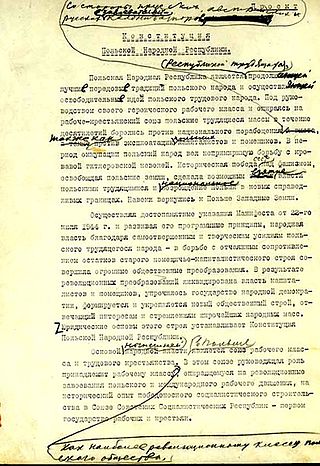
The Sejm, officially known as the Sejm of the Republic of Poland, is the lower house of the bicameral parliament of Poland.

The Senate is the upper house of the Polish parliament, the lower house being the Sejm. The history of the Polish Senate stretches back over 500 years; it was one of the first constituent bodies of a bicameral parliament in Europe and existed without hiatus until the final partition of the Polish state in 1795. The contemporary Senate is composed of 100 senators elected by a universal ballot and is headed by the Marshal of the Senate. The incumbent Marshal of the Senate is Małgorzata Kidawa-Błońska.

The coat of arms of Poland is a white, crowned eagle with a golden beak and talons, on a red background.

Poland does not legally recognize same-sex unions, either in the form of marriage or civil unions. In 2012, the Supreme Court ruled that same-sex couples have limited legal rights in regards to the tenancy of a shared household. A few laws also guarantee certain limited rights for unmarried couples, including couples of the same sex. Same-sex spouses also have access to residency rights under EU law.

The Constitutional Tribunal is the constitutional court of the Republic of Poland, a judicial body established to resolve disputes on the constitutionality of the activities of state institutions; its main task is to supervise the compliance of statutory law with the Constitution of the Republic of Poland.

Dziennik Ustaw or Dziennik Ustaw Rzeczypospolitej Polskiej is the most important Polish publication of legal acts. It is the only official source of law for promulgation of Polish laws. The publication of this journal is solely the responsibility of the Prime Minister of the Republic of Poland. 'Dziennik Ustaw' traces its history to the 1918 'Dziennik Praw Królestwa Polskiego' and has changed its name several times during its existence.

The Constitution of the Polish People's Republic was a supreme law passed in communist-ruled Poland on 22 July 1952. It superseded the post-World War II provisional Small Constitution of 1947, which in turn replaced the pre-war April Constitution of 1935.
The judiciary of Poland are the authorities exercising the judicial power of the Polish state on the basis of Chapter 8 of the Constitution of Poland. As in almost all countries of continental Europe, the Polish judiciary operates within the framework of civil law.

The Office for War Veterans and Victims of Oppression in the main institution in the Government of Poland to deal with the issues of Polish veterans of struggles for independence and victims of oppression. In 1991 a special status was set up for people of these categories, and the main tasks of the Office include awarding this status, providing care for people with this status, and disseminating the information about their life and struggle.

Adam Piotr Bodnar is a Polish lawyer, educator, human rights activist and politician who currently serves as Minister of Justice. He was the 7th Polish Ombudsman from 2015 until July 2021.

The Second Cabinet of Mateusz Morawiecki was the government of Poland, headed by Prime Minister Mateusz Morawiecki, since being sworn in by President Andrzej Duda on 15 November 2019 until 27 November 2023. The Prime Minister delivered a statement to the Sejm on 19 November 2019 before obtaining a vote of confidence with 237 of the 460 MPs voting in the affirmative.
The Polish constitutional crisis, also known as the Polish rule-of-law crisis, is a political conflict ongoing since 2015 in which the Polish government has been accused of failing to comply with European and Polish constitutional law. The 2015 elections resulted in the Law and Justice party winning control of both the presidency and the parliament. With this government trifecta, PiS used its power to appoint judges to the Constitutional Tribunal in 2015, leading to the 2015 Polish Constitutional Court crisis. The government of Poland continued to expand its hold on the judiciary resulting in the 2017 Supreme Court crisis, and the 2019 Polish judicial disciplinary panel law. These events allowed the legislature and executive of the Polish government to have de facto control over judges and their appointments.

Ewa Łętowska is a Polish lawyer, a specialist in civil law and professor of legal science. Since 1985, she has worked at the Institute of Law of the Polish Academy of Sciences and since 1997, she has been a member of the Polish Academy of Arts and Sciences. In 1988, she became the first person to be appointed the Ombudsman for Citizen Rights in Poland. Between 1999 and 2002, she served as a judge at the Supreme Administrative Court of Poland and between 2002 and 2011 as a judge of the Polish Constitutional Tribunal.

Fundacja Trans-Fuzja is a Polish LGBT rights organization. It was founded in February 2008 and acquired the status of a public interest organisation (OPP), working to better the wellbeing of transgender people in Poland.

Adam Stanisław Zieliński was a Polish lawyer and politician. A member of the Polish United Workers' Party, he served as president of the Supreme Administrative Court of Poland from 1982 to 1992, a member of the Sejm from 1989 to 1991, and Polish Ombudsman from 1996 to 2000.

Piotr Sylwester Wawrzyk is a Polish government official. He was the Deputy Foreign Minister until 31 August 2023 when he and seven others were removed from office for accepting bribes in return for issuing official visas.
The Ministry of State Assets (MAP) is a Polish government administration office currently serving the minister responsible for two departments of government administration: state assets and communications. The ministry was established on November 15, 2019, following the transformation of the Ministry of Energy, and has undergone several reorganizations in subsequent years. The competency equivalent of the office before 2017 was the Ministry of State Treasury.
The General Director for Environmental Protection is a central government administration body in Poland responsible for environmental protection and nature conservation, carrying out its tasks with the assistance of the General Directorate for Environmental Protection.
Draginja Nadażdin is a Serbian-Polish activist for human rights, and was the director of Amnesty International Poland (2007–2021).























